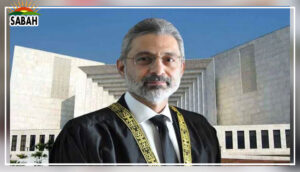Supreme Court of Pakistan nullifies its previous decision regarding Article 63-A
ISLAMABAD, Oct 3 (SABAH): The Supreme Court of Pakistan has nullified its previous decision regarding Article 63-A, marking a significant shift in the legal interpretation of the clause.
The ruling was delivered by a five-member larger bench headed by Chief Justice Qazi Faez Isa, in response to multiple review petitions challenging the Supreme Court’s earlier decision issued in 2022.
The court’s ruling on Thursday stated that the defecting lawmakers’ votes should indeed be counted, revoking the apex court’s previous judgment.
The court also noted that the detailed judgment on the matter would be issued at a later date, with the bench announcing a unanimous short order.
Earlier in 2022, a five-member bench of the Supreme Court led by then Chief Justice Umar Ata Bandial in a narrow 3-2 decision had declared votes cast by defecting lawmakers’ as invalid.
The 2022 ruling had come in response to a presidential reference filed by then-President Arif Alvi. The Supreme Court has overturned its previous ruling amid attempts by the incumbent government to bring in judicial reforms and constituional amendments that require a two-thirds majority in the parliament which the ruling coalition does not have.
The Pakistan Tehreek-e-Insaf (PTI) has decided to withdraw from the ongoing proceedings in the Supreme Court’s hearing of the Article 63A review appeals.
The decision came as a five-member larger bench led by Chief Justice of Pakistan Qazi Faez Isa resumed hearing of the review case.
PTI lawyer Ali Zafar nformed the court that the party wished to step aside from the judicial process, noting that former PTI chairman Imran Khan wanted to appear in person.
Zafar also raised concerns about potential constitutional amendments, which he said could impact the ongoing proceedings. The chief justice, however, discouraged political commentary during the legal proceedings.
He expressed disappointment over PTI’s withdrawal, remarking, “It is unfortunate, as we wanted to hear your arguments.” Nevertheless, the court appointed Ali Zafar as a judicial assistant to aid in the future hearings of the case.
Zafar also brought up concerns about potential amendments that could extend the tenure of the Chief Justice of Pakistan, which led to a stern response from the bench.
The chief justice warned Zafar about his choice of words, cautioning that such statements could be seen as contempt of court.
The hearing also witnessed discussions on constitutional amendments and their impact on the judiciary, with Justice Jamal Khan Mandokhail questioning the implications if the chief justice himself refused any tenure extension.
Earlier during the hearing Supreme Court of Pakistan dismissed objections raised by the PTI legal team stating that the chief justice cannot compel any judge to sit on a bench and found the objections to be legally unjustified.
Addressing the late filing of the review petition, the court clarified that the petition was submitted 21 days before the detailed decision was issued, dismissing PTI’s concerns.
PTI’s lawyer, Ali Zafar, had also questioned the formation of the bench, objecting to the inclusion of certain judges.
The Supreme Court maintained that bench formation follows legal protocols and emphasised that Justice Mansoor Ali Shah had voluntarily excused himself, leading to Justice Naeem Akhtar Afghan’s inclusion.
The court further addressed PTI’s claim that the review petition was heard out of turn, stating that the petition was correctly scheduled and that opposition to its timing lacked support from the Additional Attorney General and Farooq H. Naek, with Ali Zafar being the sole objector.
Additionally, the court clarified the role of the President in filing references, stating that as a symbol of national unity, the President is not required to issue notices to every citizen when filing a reference, thus outlining the legal process.
Regarding bench formation, the Supreme Court reiterated that while the chief justice oversees bench formation, he is not legally obligated to explain his decisions. In this case, the chief justice voluntarily issued a clarifying statement despite no legal requirement.












